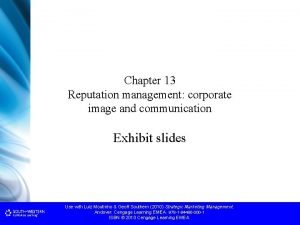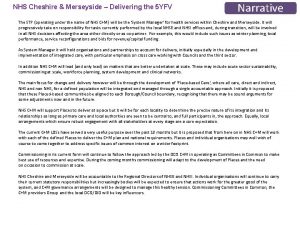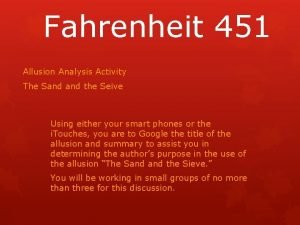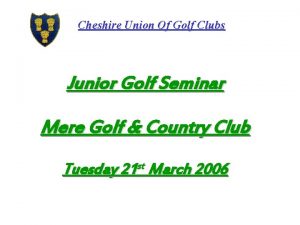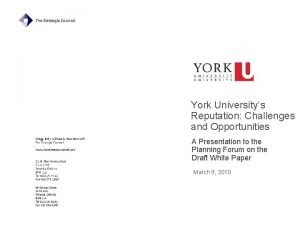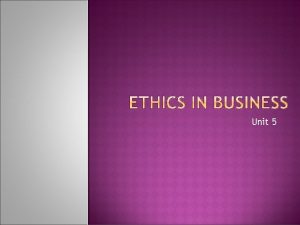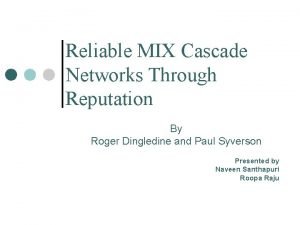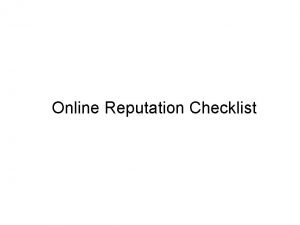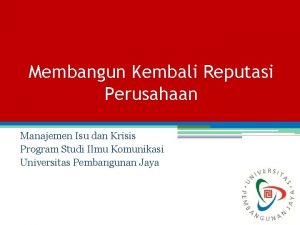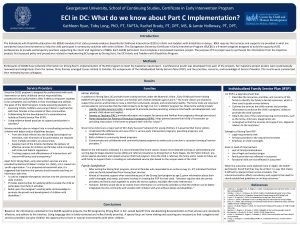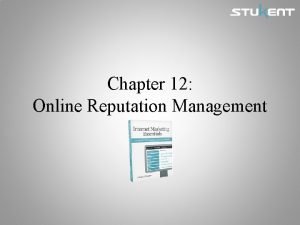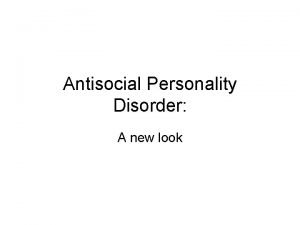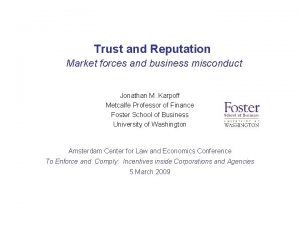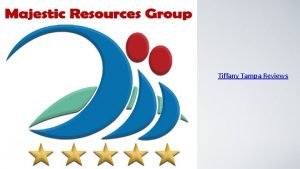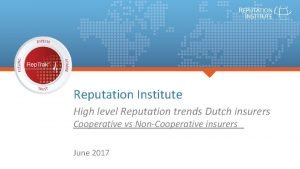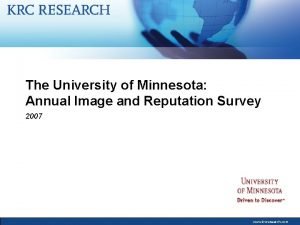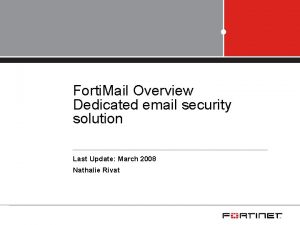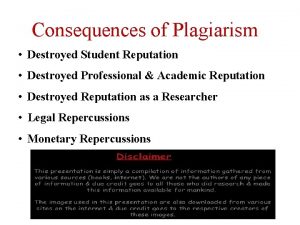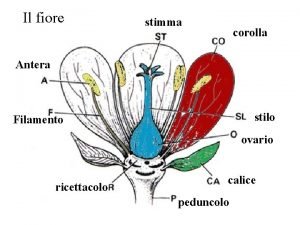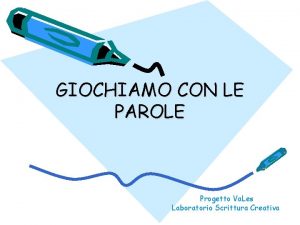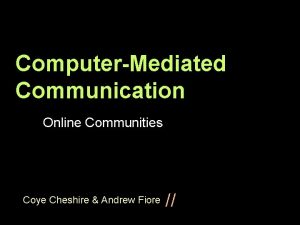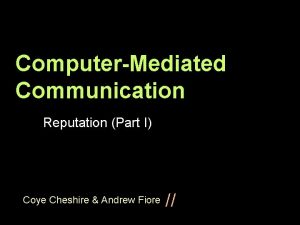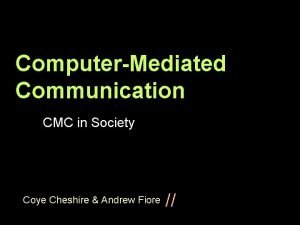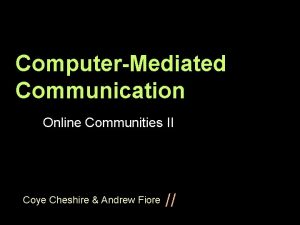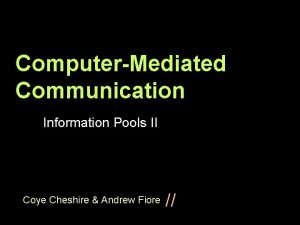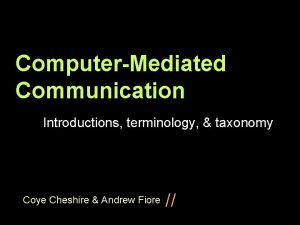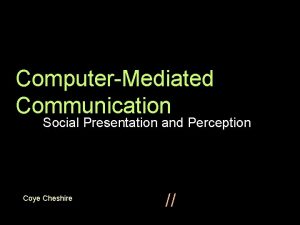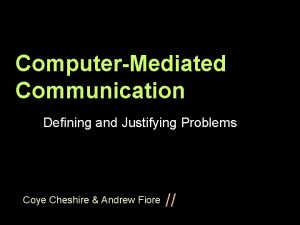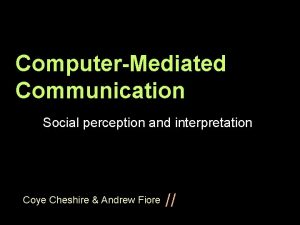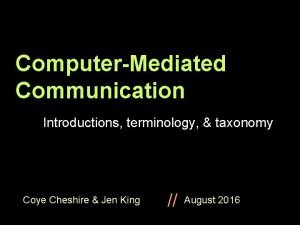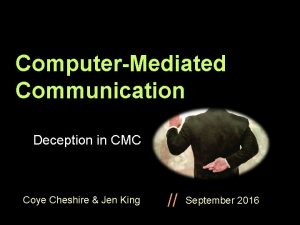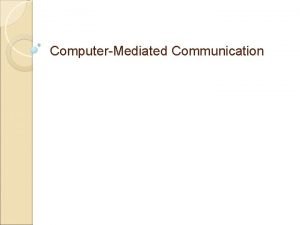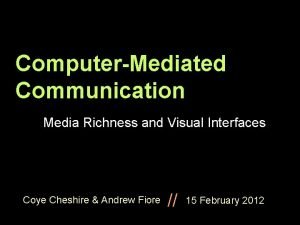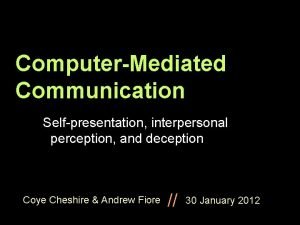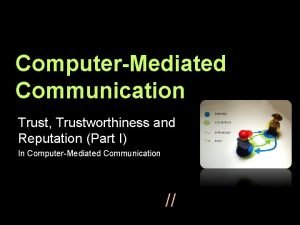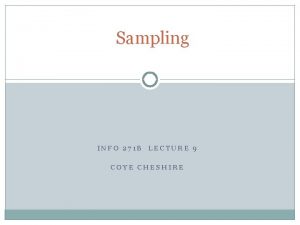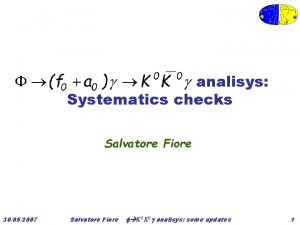ComputerMediated Communication Reputation Coye Cheshire and Andrew Fiore












































- Slides: 44

Computer-Mediated Communication Reputation Coye Cheshire and Andrew Fiore //

Assignment 1: Group Projects 3/7/12 Computer-Mediated Communication 1

Assignment #2 § …. 3/7/12 Computer-Mediated Communication 2

Wrapping up Trust: The Downside to Sanctions and Assurance Structures § Reliance on interpersonal mechanisms of trust building often replaced by organizational assurance structures (monitoring and sanctioning) § Paradoxically, these assurance structures reduce possibility of ongoing trust relations 3/7/12 Computer-Mediated Communication 3

The Certainty-Trust Contradiction Online “Certainty” 3/7/12 Interpersonal Trust Computer-Mediated Communication 4

What are the Solutions to Uncertainty in CMC Environments? Proxies and ‘inferred trustworthiness’ Institutional backing Closed Systems versus Open Systems § Experiential, often negativeonly reputations (not explicit) 3 rd party (explicit) reputation 3/7/12 Computer-Mediated Communication 5

Oh no, lemons! 3/7/12 Computer-Mediated Communication 6

Information asymmetry: Used cars After the Before sale… the sale. Buyer Seller 3/7/12 Computer-Mediated Communication 7 Images from khulsey. com

3/7/12 Computer-Mediated Communication 8

In the early 11 th century a trader from Tunisia, momentarily residing in Sicily, wrote a long, distraught letter to a business associate in Egypt. Sumhun ben Da’ud complained to his correspondent, Joseph ben’Awkel of Fustat (old Cairo), that “my reputation is being ruined. ” Sumhun had asked Joseph to pay two of Sumhun’s creditors in Fustat, and Joseph hadn’t done it. Now Sumhun complained that those unpaid creditors were writing to parties all along the Mediterranean basin, letters “filled with condemnations, ” which have “reached everyone. ” — C. Faille, “Trading on Reputation” 3/7/12 Computer-Mediated Communication 9

Open versus Closed Systems 3/7/12 Computer-Mediated Communication 10

3/7/12 Computer-Mediated Communication 11

Closed System Examples in CMC: Open Source System, e. g. , Linux (kernel vs. GUI) Wikipedia (You cannot change anything you want? For real? ? ) 3/7/12 Computer-Mediated Communication 12

3/7/12 Computer-Mediated Communication 13

“Reputation” systems Ratings by others Explicit Derived from behavior Implicit Join Date: Mar 2004 Posts: 22 Direct experience of behavior: “bilateral Computer-Mediated Communication reputation” Experience 3/7/12 14

Explicit reputation: Positive vs. negative systems +/ – Positive Negative Useful when: – Open system – Identity transient – Exclusion impossible 3/7/12 Useful when: – Closed system – Identity persistent – Coalitions exist, no alternatives Computer-Mediated Communication 15

How might different types of reputation systems solve the lemons problem? 3/7/12 Computer-Mediated Communication 16

“Reputation” systems Ratings by others Explicit Derived from behavior Implicit Join Date: Mar 2004 Posts: 22 Direct experience of behavior: “bilateral Computer-Mediated Communication reputation” Experience 3/7/12 17

Yamagishi’s Experiment § All participants play role of buyer and seller in an open market § Participants create ‘goods’ of some value (x), and sell at price (y). § Production points and payouts come from the experimenter § Buyers receive 1. 5 times the true Buyer gets value of the good. 60 x 1. 5 = 90 points 3/7/12 Computer-Mediated Communication 18

3/7/12 Computer-Mediated Communication 19

Yamagishi’s Experimental Conditions § Anonymity § Identity § Reputation 3/7/12 Computer-Mediated Communication 20

Yamagishi et al. (First Experiments) Conditions of Environment Outcome (Independent Variables) (Dependent Variable) -Anonymity -Price? -Identity -Quality level? -Reputation (3 rd party only) -Probability of item being sold? -Time to sale? 3/7/12 Computer-Mediated Communication 21

Quality Levels 3/7/12 Computer-Mediated Communication 22

Levels of “dishonesty” 3/7/12 Computer-Mediated Communication 23

Yamagishi et al. (Second Set of Experiments) Reputation System Outcome (Independent Variable) (Dependent Variable) -Positive -Price? -Negative -Quality level? -Mixed -Probability of item being sold? -Time to sale? 3/7/12 Computer-Mediated Communication 24

Comparing Quality Levels 3/7/12 Computer-Mediated Communication 25

3 rd Experiment: Mock Auction Making the experiments a bit more “ecologically valid: less like a lab study and more like the real world 3/7/12 Computer-Mediated Communication 26

Quality levels over time (3 rd Expt, Mock Auction) 3/7/12 Computer-Mediated Communication 27

Resnick et al. 2006 Effect of strong reputations on revenues compared to those without reputation Effect of “negatives” in a brief reputation on outcome of revenue 3/7/12 Computer-Mediated Communication 28

Matched Pairs by Different Sellers 3/7/12 Computer-Mediated Communication 29

Reputation Effects § Do strong reputations matter? § What is the impact of negative reputation marks in a mixed reputation system such as e. Bay? 3/7/12 Computer-Mediated Communication 30

Critiquing Methodological Approaches to Similar Problems 3/7/12 Computer-Mediated Communication 31

Two approaches to studying online reputation system (Ebay) § Why study it in a lab? § Why study it in a field experiment? 3/7/12 Computer-Mediated Communication 32

Putting Experimental Work in Context § Selection of subjects (i. e. , what do they value? ) § Task length and learning § Accounting for time in statistical analyses § Do not assume that an experiment is even trying to ‘recreate’ a specific real-life situation unless they explicitly say so– and even then you should always consider the scope of the experiment. 3/7/12 Computer-Mediated Communication 33

The Validity Problem Internal Validity 3/7/12 External Validity Computer-Mediated Communication 34

External Validity: Generalizing From Experiments ? 3/7/12 Computer-Mediated Communication 35

Ecological Validity: Approximation of Real-Life Activity Yamagishi et al. 3/7/12 Resnick et al. Computer-Mediated Communication 36

Resnick et al. 2006 3/7/12 Computer-Mediated Communication 37

Other Implicit ‘Reputation’ Information in CMC? 3/7/12 Computer-Mediated Communication 38

Another side of reputation… “Internet markets also have significant advantages in establishing reputations … any information that is gleaned can be near costlessly tallied on a continuing basis … [and] that information can be near costlessly transmitted to millions of potential customers. ” — Resnick et al. 2006, p. 80 3/7/12 Computer-Mediated Communication 39

The CMC and ‘Offline’ Reputation Link: Emergent Reputation Systems and Identity 3/7/12 Computer-Mediated Communication 40

As designers, what can we learn from all of this? § What kind of community do you have (or are you trying to foster)? § When and why should you use positive, negative, mixed, or hybrid reputation systems? § What behavior(s) do you want to encourage, reward, discourage, punish? § Consider the “unintended consequences” of implicit information § Just because you build a system to be interpreted a certain way doesn’t mean that the user will agree… 3/7/12 Computer-Mediated Communication 41

Break 3/7/12 Computer-Mediated Communication 42

In-class design activity 3/7/12 Computer-Mediated Communication 43
 Reputation management corporate image and communication
Reputation management corporate image and communication Cheshire and merseyside training hub
Cheshire and merseyside training hub Cheshire and merseyside stp
Cheshire and merseyside stp The trickster archetype
The trickster archetype Sand
Sand Cheshire ireland pay scale
Cheshire ireland pay scale Fahrenheit 451 english
Fahrenheit 451 english Cheshire constabulary
Cheshire constabulary Cheshire union of golf clubs
Cheshire union of golf clubs David cheshire aecom
David cheshire aecom Cheshire home serampore
Cheshire home serampore York university bad reputation
York university bad reputation Enjoy a reputation
Enjoy a reputation Hersay in court
Hersay in court Eugene bagdasaryan
Eugene bagdasaryan Reputation cascade
Reputation cascade Online reputation checklist
Online reputation checklist Executive ethical leadership reputation matrix
Executive ethical leadership reputation matrix Reputation management for surgeons
Reputation management for surgeons Rebuilding reputation after crisis
Rebuilding reputation after crisis Reputation in victorian society
Reputation in victorian society Reputationsmanagement für restaurants
Reputationsmanagement für restaurants Theme vs thesis
Theme vs thesis Georgetown school of continuing studies reputation
Georgetown school of continuing studies reputation Types of online reputation management
Types of online reputation management Covetous antisocial
Covetous antisocial Enron stock chart
Enron stock chart Reputation marketing tampa
Reputation marketing tampa Reputation nq
Reputation nq What was rebecca nurse reputation in the community
What was rebecca nurse reputation in the community University of minnesota reputation
University of minnesota reputation Dartmouth reputation
Dartmouth reputation Hsh+
Hsh+ Forti mail
Forti mail Why did new netherland gain a reputation for diversity
Why did new netherland gain a reputation for diversity Repercussions of plagiarism
Repercussions of plagiarism Online reputation management objectives
Online reputation management objectives He made himself of no reputation
He made himself of no reputation Amore ritorna le colline sono in fiore
Amore ritorna le colline sono in fiore Come è formato il fiore
Come è formato il fiore Sepali del fiore
Sepali del fiore Tautogramma esempio
Tautogramma esempio Florencia catedral santa maria dei fiori
Florencia catedral santa maria dei fiori Fiore pediatra
Fiore pediatra Le gimnosperme hanno fiori
Le gimnosperme hanno fiori
